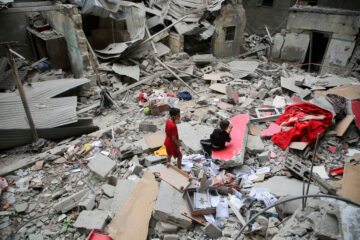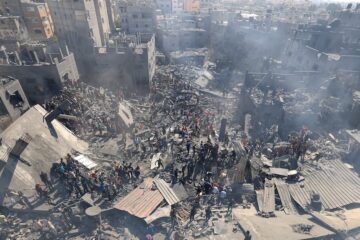IS under pressure as troops advance on Palmyra, Mosul
Syrian troops on Thursday entered the ancient city of Palmyra and Iraqi forces launched an offensive against Mosul as pressure mounted on key strongholds of the Islamic State group.
US Secretary of State John Kerry was meanwhile holding talks in Moscow to push for peace efforts in Syria, from where IS has claimed attacks on the West including this week\’s bombings in Brussels.
Backed by Russian warplanes and allied militia on the ground, the Syrian army advanced into Palmyra Thursday after launching a desert offensive early this month, the Syrian Observatory for Human Rights monitoring group said.
IS overran Palmyra — known as the "Pearl of the Desert" — last May and it has since blown up UNESCO-listed temples and looted relics that dated back thousands of years.
"Regime forces have entered the Hayy al-Gharf neighbourhood in the southwest of Palmyra. They are advancing very slowly because of mines planted by IS," Observatory director Rami Abdel Rahman told AFP, adding that troops were also advancing from the city\’s north.
A Syrian military source confirmed the advance into the city, saying the army had entered from the northwest after seizing control of part of the historic Valley of the Tombs.
"The clashes, which are ongoing, are fierce," he told AFP.
Syria\’s antiquities chief Maamoun Abdelkarim hailed the "imminent" recapture of Palmyra, vowing to rebuild monuments the jihadists destroyed.
"I am so happy that the liberation is imminent… and that the nightmare is nearly over, before it is too late, before the total destruction of the ancient city," he told AFP.
"I think this 10-month period has been the worst of our lives," Abdelkarim said.
IS had earlier urged civilians to flee the city, where about 15,000 of its 70,000 original residents remained after the jihadist takeover.
Palmyra\’s recapture would be a major strategic and symbolic victory for President Bashar al-Assad, since whoever holds it also controls the vast desert extending from central Syria to the Iraqi border, experts say.
Across the border, Iraqi forces announced the start of an offensive to retake the second city of Mosul, IS\’s main hub in Iraq.
The army and the Popular Mobilisation paramilitary force "have begun the first phase of conquest operations" in the northern Nineveh province, of which Mosul is the capital, Iraq\’s joint operations command said in a statement.
It said four villages had been taken between the town of Qayyarah, which is held by IS, and Makhmur, where US-backed Iraqi forces have been massing in recent weeks.
Prime Minister Haider al-Abadi issued a statement congratulating the fighters for "launching the operation to retake Nineveh and achieving their first success with the recapture of some villages."
The army did not say how long this phase of the operation was expected to take and Iraqi forces still look far from being in a position to take the city itself.
Experts have warned that any battle to retake Mosul will be difficult, given the significant number of jihadists and civilians in the city and the time IS has had to prepare defences.
In Moscow, Kerry was to see if President Vladimir Putin could be convinced to support an end to Assad\’s rule in Syria, as the regime and opposition hold negotiations in Geneva.
He met his counterpart Foreign Minister Sergei Lavrov and was later to head to the Kremlin for rare talks with Putin.
"I know that many people are very hopeful, Sergei," Kerry said in brief remarks before the talks.
"We both know that more needs to be done in terms of both the reduction of violence and the flow of humanitarian goods," Kerry told Lavrov.
Tuesday\’s bombings in Brussels "underscore the urgency" of fighting IS and other extremist organisations, he added.
The Moscow meetings came as UN envoy Staffan de Mistura met the government delegation to Geneva, on the final day in the current round of indirect peace negotiations.
Assad\’s future has been a key obstacle in the latest talks, with the government insisting any discussion of him leaving is "excluded" and the opposition saying any talk of allowing him to stay is "absolutely unacceptable".
SOURCE: AFP
[do_widget_area inner_adsbar]









